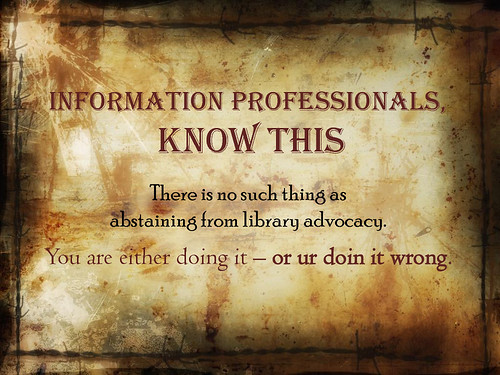A quick catch-up post for all the stuff I've not mentioned in previous posts but which has happened in the last couple of months.
The Echo Chamber
Lots of echolib stuff has been happening recently. The article I wrote a while ago for Library & Information Update has finished its embargo and so now can be made available - I've been displaying it on the Echo Chamber Netvibes page, but you can also download it in PDF format, here.
Continuing the Stealth Advocising theme from a few weeks back, I created a video version of my If you want to work in libraries... slide-deck. It has some funky hip-hoppy latin music in it that I wrote when I was about 17! Woof. Here it is - as ever, in the interests of spreading the messages far and wide, feel free to use this however you like, embed it wherever, etc etc.
The Slideshare version of this has now been viewed more than ten thousand times, so surely LOADS of those people must be outside the echo chamber, right..?
I also wrote an article for PostLib, the journal for retired librarians! I was really pleased to be asked to do this, I like to see the divide between senior and new professionals being bridged whereever possible. The resultant article is now available: Statistics, the Media and the Library Legacy (PDF) - and owes a big debt to Ian Clark [Thoughts of a Wannabe Librarian] who read it over for me and gave me his approval to use some of his ideas! It mentions the echo chamber in passing - but really the main thrust of it is to note that, if you take combined footfall and internet usage stats, public library use in the UK is actually UP over the last couple of years (quite considerably), contrary to popular reports.
Laura and I will present a new version of the Echo Chamber presentation in Cambridge in a couple of days, to an audience of 200 or so people - the biggest we've spoken to yet, so we're really excited about that.
LISNPN
There's also a couple of articles I wrote about LISNPN, the New Professionals Network, available elsewhere. They're both on CILIP platforms but both are freely available to all - Moving forward together opens Library Information Gazette in digital form, and The LIS New Professionals Network takes you to CILIP's Information & Advice blog.
Look out for a BIG competition on LISNPN later this month, with a library-related-prize worth literally hundreds of pounds and well worth winning.
Library Routes Project
Remember Library Routes? It's still going! And there's plenty of great entries that have come in in recent months - there's now over 150 contributions from Information Professionals about how they got into librarianship, and their path through the profession. Check it out if you haven't already, or if you've not done so for a while. The project homepage has more than 25,000 views now, so maybe some of those will be from people outside the Echo Chamber too.
Gazette Profile
I was really pleased that Debby Raven featured me in the last but one edition of Gazette, following up on the Essential Careers Advice for New Professionals post. You can read the interview, again via the Digital Gazette magazine platform, here. Incidentally the permanent, to-be-added-to, and containing the wisdom of the people who've commented on the original, version of the Essential Careers Advice post is here on its own page of the blog - check it out and tell if there's anything that needs adding to it. What do you know now that you wish you'd known earlier?
All of these articles are available together on the Papers & Presentations page of my website.
And finally...
I created a hectoring advocacy poster a few weeks back - it's deliberately harsh and provocative, but I do think there is an underlying truth to it.
Phew!
- thewikiman





